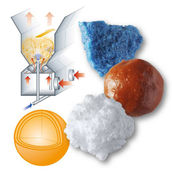Degussa 2001 Innovation Prize in the Category ?New Applications? for Scratch-Proof Coatings
Advertisement
They are extremely scratchproof, environmentally friendly - because they are free of solvents -, easy to apply and versatile in application, because they can develop their action just as well on parquet floors and papers as on metals and plastics. These are the advantages promised by acrylic paints containing the newly-developed siloxane-encapsulated nanoparticles by Degussa AG in Dusseldorf. In comparison to conventional acrylic systems, the wear resistance of these coatings is ten times higher. This spectrum of properties is made possible by the proper mix of inorganic nanoparticles based on the pyrogenic silica AEROSIL® and the organofunctional SIVENTO®silanes by Degussa in a liquid acrylic-based UV-crosslinkable binder. Reason enough for Degussa to reward the achievement of researchers Dr. Björn Borup, Roland Edelmann and Dr. Jaroslaw Monkiewicz of the Aerosil & Silanes Business Unit with the Group?s internal 2001 Innovation Prize in the category "New Applications", since success on the market is already evident. The prize carries a money award of ?25,000 and goes to outstanding research work by employees.
With their development, the three Degussa researchers, in cooperation with the Institute of Surface Modification in Leipzig, have succeeded in combining two normally mutually exclusive effects: a high percentage of inorganic nanoparticles of silicon dioxide (SiO2), while improving the scratch resistance of a paint, also elevates its viscosity because of the polar particle surface, making it harder to process. To circumvent this problem, the researchers resort to a trick. They encapsulate the nanoparticles directly in the binder with a thick, soft polysiloxane coating of organofunctional silanes. In this way they change the polarity of the particle surface and can drastically reduce the viscosity without impairing the scratch resistance-increasing effect of the particles. In this process, the particles are transformed into nanocapsules with a very hard silicon dioxide core and a soft siloxane capsule that can be directly synthesized in the UV-crosslinkable binder or in the paint without additional solvent.
The result is a completely new inorganic/organic acrylic-based hybrid coating whose nanocapsule content can be up to over 30 percent. This high concentration is responsible for the extremely good scratch and wear resistance of the coating, which is ten times higher than conventional acrylic systems. Thanks to the incorporation of silicon-oxygen bonds, the coating is also UV-, thermally and mechanically stable.
Because of their hybrid nature, the new UV- and radiation-curing coatings combine the positive properties of inorganic materials such as hardness, mechanical stability, durability, non-flammability and UV-resistance with the advantages of organic polymers such as elasticity and crosslinkability. Further, they are highly reactive (curing within seconds), easy to apply (no special equipment needed), environmentally friendly (free of solvents) and transparent because of the small particle size. Also attractive is the wide spectrum of applications of the hybrid coatings. They are just as appropriate for parquet floors, furniture decorating paper and panel materials as they are for metallic and polymeric materials and foils.
Degussa?s organofunctional silanes research and development is concentrated in the southern Baden plant at Rheinfelden, Germany, where various SIVENTO®Silanes and the pyrogenic silica AEROSIL® are produced. Organofunctional silanes are also used as adhesion agents between inorganic materials such as glass, minerals or metal and organic polymers and plastics. They are indispensable materials in the manufacture of composites, sealants and adhesives, paints and coatings, insulation material and in foundry applications.
































































